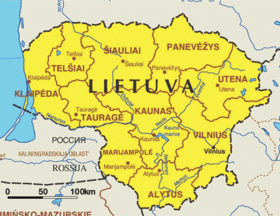Difference between revisions of "Marine Biotechnology in Lithuania"
From Coastal Wiki
| Line 1: | Line 1: | ||
{{Incomplete}} | {{Incomplete}} | ||
| − | + | {{Marine Biotechnology | |
| − | + | |Image=Image:Lith map.gif | |
| − | + | }} | |
| − | |||
| − | |||
| − | |||
| − | |||
== Overarching science strategies, plans and policies == | == Overarching science strategies, plans and policies == | ||
Revision as of 14:41, 6 March 2013

|
Go back to: Home > Strategies, Policies and Programmes > European countries
Overarching science strategies, plans and policies
Lithuanian biotechnology policy [1]
Research funding schemes and programmes
- National Industrial Biotechnology Development Programme for 2007-2010[1]
- Strengthening and sustaining the European perspectives of Molecular Biotechnology in Lithuania (MoBiLi)[2]
Research priorities for marine biotechnology research
n/a
Strategic documents
n/a
Infrastructures and coordination and support capacities / initiatives
- In 2012, Lithuania operates 2 local/coastal vessels from 21m to 23,06 m (Gintaras, Darius); 1 oceanic of 55,6m (Vejas) registered at the European Research Vessels Infobase [3].
- Association “Baltic valley”[4]
Major initiatives
n/a
References
Disclaimer
This country profile is based on available online information sources and contributions from various country experts and stakeholders. It does not claim to be complete or final, but should be considered as a dynamic and living information resource that will be elaborated, updated and improved as more information becomes available, including further inputs from experts and stakeholders. The information on this page is based on information initially compiled by the CSA MarineBiotech Project (2011-2013) and updated by the Marine Biotechnology ERA-NET (2013-2017).
